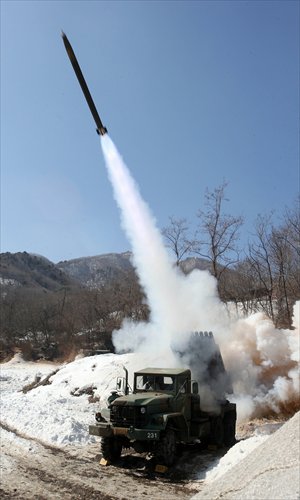
A South Korean Army multiple rocket launcher fires live rounds during a live fire drill in Cheorwon, 70 kilometers northeast of Seoul Friday. On Tuesday, Pyongyang said that it had carried out a successful underground nuclear test. Photo: AFP
Health and environmental concerns have been raised by Chinese citizens living near the border with North Korea, after it conducted its third nuclear test close to China's Jilin Province, however the atmosphere among locals remains far from the panic seen by some Chinese citizens in the wake of Japan's 2011 Fukushima power plant disaster.
The test has also prompted some locals to rethink the traditionally close ties with the neighboring nation.
North Korea conducted the nuclear test, which it claimed was successful, around Tuesday at noon in Kilju County, North Hamkyung Province, less than 100 kilometers from the Chinese border, causing an artificial earthquake with a magnitude of 4.9.
"We heard the news of the nuclear test in North Korea, but people are living their lives normally here," Xu Liang, a resident from Yanji in Jilin Province, told the Global Times, adding that local residents were paying close attention to the results of monitoring by China's environmental watchdog.
After the nuclear test the Chinese Ministry of Environmental Protection dispatched several radiation monitoring teams to evaluate the environment in Northeast China, and published the results daily from Wednesday.
No signs of artificial radioactivity were detected in Northeast China as of 11 am Friday, according to the ministry's Friday statement, and real-time monitoring results from more than 150 radiation monitoring stations across China also showed radiation at a normal level.
In the wake of nuclear radiation being released in Japan's Fukushima prefecture after a tsunami hit a nuclear power plant in 2011, Chinese citizens feared radiation might make its way into China.
"Over the past few days the passengers taking taxis talked about it (the nuclear test)," said a taxi driver surnamed Li who lives in Tumen, Jilin Province, the China News Service reported.
Residents in Hunchun, Jilin Province were just enjoying the Spring Festival holidays. Most of them told the Global Times that they hadn't encountered anything unusual, but some said they had felt the ground trembling for about one minute.
The nuclear test, which was in defiance of UN resolutions, drew worldwide condemnation and the Chinese Foreign Ministry said in a statement that China "firmly" opposed the latest nuclear test.
It was the second time North Korea drew condemnation from around the world in the space of just two months, the latest launch coming on the heels of a December rocket launch which also drew UN sanctions.
China has a consistent stance on negotiations to solve international problems, including the North Korean nuclear issue. China has always been expected to bring the North Korean nuclear issue under the framework of the Six-Party Talks.
The talks, which include North Korea, South Korea, the US, China, Japan and Russia, began in 2003 but stalled in December 2008.
"To my way of thinking, North Korea is using the nuclear test to gain more leverage in negotiations with the US," Xu told the Global Times.
North Korea would like to bypass China and other countries and engage in direct talks with the US, and possibly, North Korea might lean on the US, a country North Korea considers its major enemy, Xu added.
The Chinese people should stop focusing only on the past, but think more about the future, Chen Zhenyun, a Beijing resident, told the Global Times.

Copyright ©1999-2011 Chinanews.com. All rights reserved.
Reproduction in whole or in part without permission is prohibited.